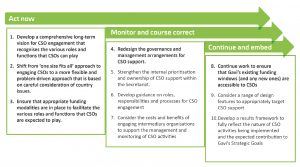According to UNICEF data, global diphtheria-tetanus-pertussis coverage rate reached 86% in 2018. But in the same year, 19.4 million children under one year of age worldwide did not receive the three recommended doses, and an estimated 13.5 million did not benefit from any life-saving vaccinations. Of these, 40% live in fragile or humanitarian settings. As a result, a child dies every 20 seconds from a disease that could have been prevented by a vaccine.
Civil society’s role
Within this context, it is widely recognised that Civil Society Organisations (CSOs) – including non-governmental organisations (NGOs), advocacy organisations, professional and community associations, faith-based organisations and academia – can support immunisation across a wide spectrum of activities. This includes:
- Playing a key role in implementing immunisation programmes complementing public service delivery, particularly in fragile and conflict-affected settings
- Helping address demand-related barriers including vaccine hesitancy
- Influencing public policy and resource mobilisation through advocacy work
- Encouraging transparency and accountability by playing a watchdog role towards governments, donors and other global health actors.
CSOs have a particularly important role to play in accessing the hard-to-reach, such as in conflict situations, and the marginalised, contributing to overcoming inequitable access. They have also often been the implementers of innovative approaches to improve immunisation coverage and reach.
What is Gavi?
Gavi, the Vaccine Alliance, is an international organisation created in 2000. Gavi brings together public and private sectors with the shared goal of creating equal access to new and underused vaccines for children living in the world’s poorest countries, thereby saving lives and protecting health around the globe.
Gavi and CSOs
Gavi understands CSOs make a fundamental contribution to its immunisation objectives, particularly in reaching marginalised and hard-to-reach communities in rural and urban settings. With this view in mind, Gavi has been committed to engaging CSOs since its inception.
Over the 2011–2015 and 2016–2020 strategic periods, the two main mechanisms through which Gavi has attempted to deliver this strategic objective have been:
- CSO platform support, involving the establishment of CSO platforms in countries to strengthen CSO engagement with immunisation processes and policies
- Support to CSOs through Gavi’s HSS grants to support CSO activities to improve systems for vaccine delivery.
Evaluation of Gavi’s support to CSOs
In 2018 Gavi commissioned Itad to conduct a formative evaluation of its work in support to CSOs between 2011 and 2017. This would inform its approach to engaging CSOs up to 2020 and in the next Gavi Strategy.
After eight months of intensive data collection and analysis, and extensive consultations with its Geneva-based Secretariat, the evaluation team facilitated the co-creation of 10 actionable and prioritised recommendations, depicted below.

The evaluation report was positively received by the Gavi Secretariat and they recently published a comprehensive management response. This agreed with eight of the 10 Itad recommendations and partly agreed with the others. The response sets out clear actions, including responsibilities and timeline.
It’s not very common to see a clear line of sight between evaluation findings, recommendations and actions planned in response. We are very pleased to see that Gavi has found the evaluation useful and is already using it to shape the way it engages CSOs. Hopefully, this will enable partner CSOs to maximise their contribution to immunisation and hence to avoid preventable deaths of children and adult around the world, until no-one is left behind.

